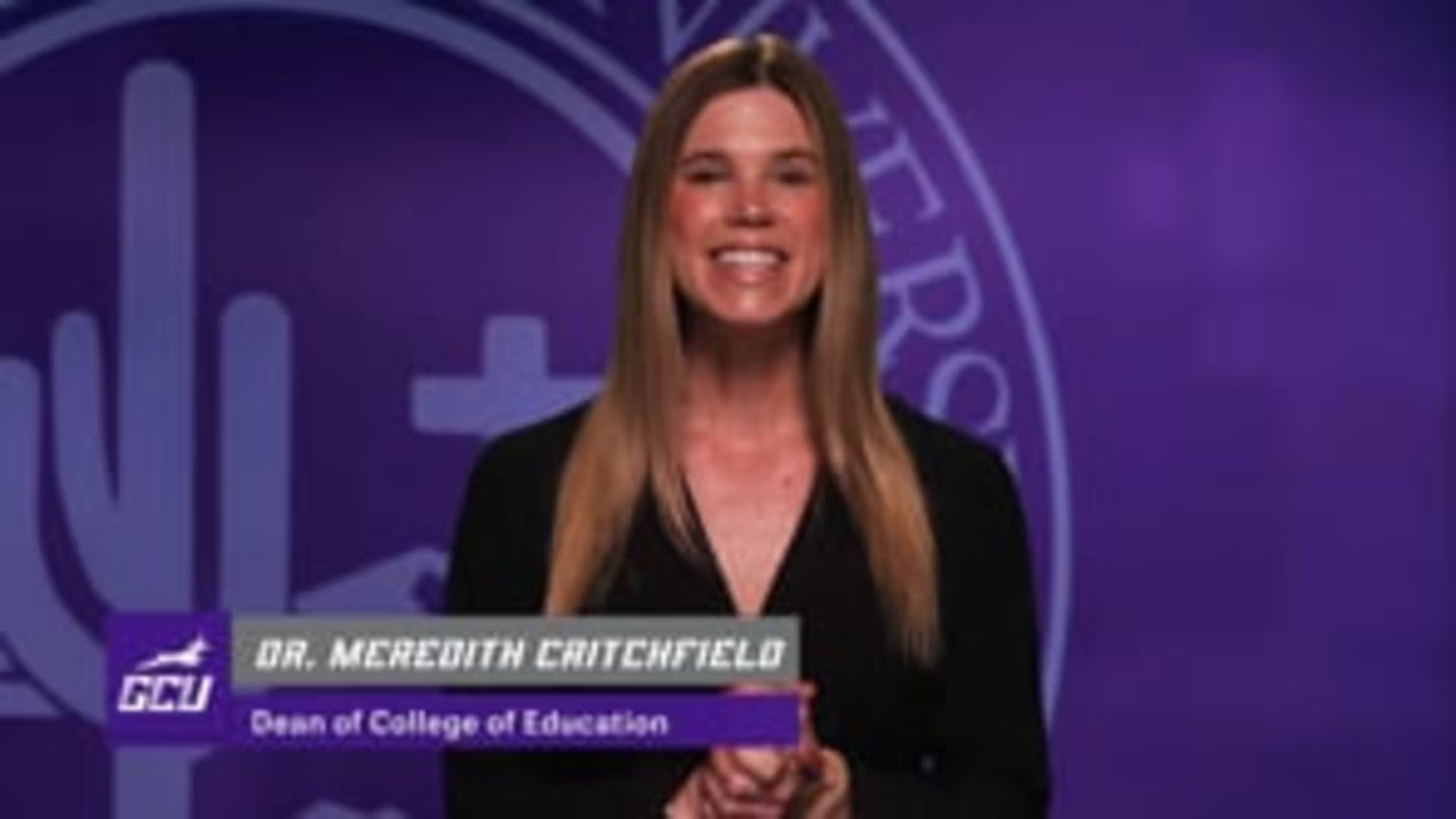
Online MEd in Early Childhood Education and Early Childhood Special Education (ECSE)
Make a Lasting Impact on Early Learners
If you’re passionate about the importance of early childhood education (ECE) and early childhood special education (ECSE), you can turn your passion into purpose at Grand Canyon University. Our Master of Education (MEd) in Early Childhood Education and Early Childhood Special Education is designed to prepare students who hold a non-teaching bachelor’s degree to pursue teacher licensure.
This online(See disclaimer 1) master’s in early childhood education and early childhood special education degree teaches instructional and assessment methodologies, as well as the psychological, emotional and developmental needs of young children. Candidates will explore field experience opportunities in both welcoming learning environments and special education birth to pre-K and K-3 settings. GCU candidates are trained to serve as effective advocates who positively influence children, families and communities.

Up to 12 credits or 1/3 of the total program requirements in transfer (whichever is less)
Credits: Fill out the Lopes Eval to find out what will transfer
Admission Requirements (Master's)
- Undergraduate Degree*
- 2.8+ GPA
OR 2.5+ Unweighted GPA and
- GMAT: 500
- GRE: 300 combined**
Admission requirements may differ based on degree level, program and modality, or transfer status. Some programs of study may require a higher GPA and/or other qualifying criteria for admission. Please review full admission and program requirements in the University Policy Handbook.
* Degree must be from an accredited college or program that has been approved by GCU.
** Combined verbal/quantitative, after August 2011 (1,000 combined verbal and quantitative, prior to August 2011).
Purpose-Driven Early Childhood Education
GCU offers this career-focused MEd to those who have a bachelor’s degree in a field other than education and who would like to pursue a certificate in teaching in an early childhood setting. This nontraditional pathway can teach you the foundational concepts you need to get started in early childhood education without having to enroll in another bachelor’s degree program.
Offered by the College of Education, our online MEd in Early Childhood Education and Early Childhood Special Education program provides faith-integrated courses that reflect GCU’s Christian worldview. We encourage our students to become principled servant leaders who better their communities.
GCU offers the convenience and flexibility of earning your early childhood education master’s degree online. By blending didactic coursework with practice-based experiences, including student teaching, you can balance your career commitments while advancing your education.
This MEd program in ECE and ECSE leads to initial teacher licensure. The ECSE curriculum is aligned with the standards of the Interstate New Teacher Assessment and Support Consortium (InTASC), the International Society for Technology in Education (ISTE), the National Association for the Education of Young Children (NAEYC) and the Council for Exceptional Children (CEC).
MEd in Early Childhood Education and ECSE: Core Competencies and Practical Experience
Children with learning differences need extra support to reach their full potential. After graduating from this master’s degree program, you can apply evidence-based pedagogical methods that support young learners as they develop crucial academic and life skills.
Along with the didactic coursework online, you will complete practicum/field experiences and student teaching experiences in both general education and special education settings. These immersive learning experiences are opportunities for you to practice competencies such as instructional methods and classroom management while benefiting from the guidance of an experienced teacher.
This online master’s in early childhood education and early childhood special education teaches the following core competencies:
STEM instructional methodologies
Instructional methodologies for teaching STEM subjects, including inquiry-based and hands-on learning activities with an eye toward differentiated learning outcomes
Alternative and augmentative communication (AAC)
The use of AAC devices to facilitate receptive and expressive language skills and early literacy development
IFSPs and IEPs
Develop, contribute to and update Individualized Family Services Plans (IFSPs) and Individualized Education Plans (IEPs), and collaborate with families and other professionals to help children reach their goals
Early literacy and language skills
The foundations of early language acquisition, including oral language development, as well as literacy formation from birth through age eight
Legal compliance and advocacy
Special education laws and professional practices, including the identification and use of community resources to advocate for children and their families

Teaching Eligibility: Licensure vs. Non-Licensure
All states have established eligibility criteria for teachers, including educational and credentialing requirements. This degree at GCU leads to dual certification in Arizona for the following certification options:
Licensing requirements are different for each state. Check with the Board of Education in the state in which you will be teaching to ensure you can fulfill all licensure requirements.

Opportunities for Educators in Early Childhood Education and ECSE
Every child needs a solid foundation for continued learning and lifelong success. Early childhood education and early childhood special education are essential for giving each child the start they need in life. This master’s degree can help you make a positive impact on children and families by working with young learners from birth through the third grade.
Graduates may pursue the following teaching opportunities in public or private schools:(See disclaimer 2)
Preschool teacher
Postsecondary education teacher
Kindergarten teacher
Elementary school teacher
Teaching assistant
Median annual wage for kindergarten and elementary school teachers as of May 2024(See disclaimer 3)
New openings expected for kindergarten and elementary school teachers each year from 2024 to 2034(See disclaimer 4)
Settings You May Work in as an MEd Graduate
As a master’s degree graduate, you may perform tasks that include coordinating programs, developing curriculum, performing research, developing policies related to early childhood and special education or advocating for young children with exceptionalities.
You may pursue a career in various settings focused on delivering services to children, such as:(See disclaimer 3)
Preschools
Public and private schools
Daycare centers
Private practices
Earn Your MEd at an Accredited University
This MEd in Early Childhood Education and Early Childhood Special Education has received programmatic accreditation from the Association for Advancing Quality in Educator Preparation (AAQEP). AAQEP accreditation is an acknowledgment that this MEd is effective at preparing educators to succeed in the classroom.
Additionally, GCU is an institutionally accredited university, having been continuously accredited by the Higher Learning Commission since 1968. The College of Education shares the university’s commitment to upholding the principles and standards established by our accrediting bodies.
Frequently Asked Questions
GCU has compiled these frequently asked questions to provide you with more information about this degree and to help you make informed decisions about your education and future career.
What does ECSE mean in education?
Is an MEd in Early Childhood Education and Early Childhood Special Education worth it?
What is the highest degree in early childhood education?
Program Curriculum
Core Courses

Ready to pursue a career that can make a positive difference in the lives of young children? Apply to GCU’s online MEd degree.
If you are seeking licensure/certification, please refer to the "Accreditation and Compliance/State Disclosures” link for the specific program of interest’s website for your location and/or employment state’s licensure requirements, per 34 CFR 668.14(b)32 and 668.43(c).
Excluding observational and practice-based experiences and student teaching.
- Indeed Editorial Team. (2025, Oct. 23). What Can You Do With a Master’s in Early Childhood Education? Indeed. Retrieved December 2025.
- The earnings referenced were reported by the U.S. Bureau of Labor Statistics (BLS), Kindergarten and Elementary School Teachers as of May 2024, retrieved December 2025. Due to COVID-19, data from 2020 to 2023 may be atypical compared to prior years. BLS calculates the median using salaries of workers nationwide with varying levels of education and experience. It does not reflect the earnings of GCU graduates as kindergarten and elementary school teachers, nor does it reflect the earnings of workers in one city or region of the country or a typical entry-level salary. Median income is the statistical midpoint for the range of salaries in a specific occupation. It is very unlikely that a median salary will reflect an entry-level salary. It represents what you would earn if you were paid more money than half the workers in an occupation, and less than half the workers in an occupation. It may give you a basis to estimate what you might earn at some point if you enter this career. Grand Canyon University can make no guarantees on individual graduates’ salaries. Your employability will be determined by numerous factors over which GCU has no control, such as the employer the graduate chooses to apply to, the graduate’s experience level, individual characteristics, skills, etc. against a pool of candidates.
- COVID-19 has adversely affected the global economy and data from 2020 to 2023 may be atypical compared to prior years. Accordingly, data shown is effective August 2025, which can be found here: U.S. Bureau of Labor Statistics, Occupational Outlook Handbook, Kindergarten and Elementary School Teachers, retrieved December 2025.


